General
Mufti Menk urges youth on productivity, social media usage & entrepreneurship
Published
2 years agoon
By
Mak Editor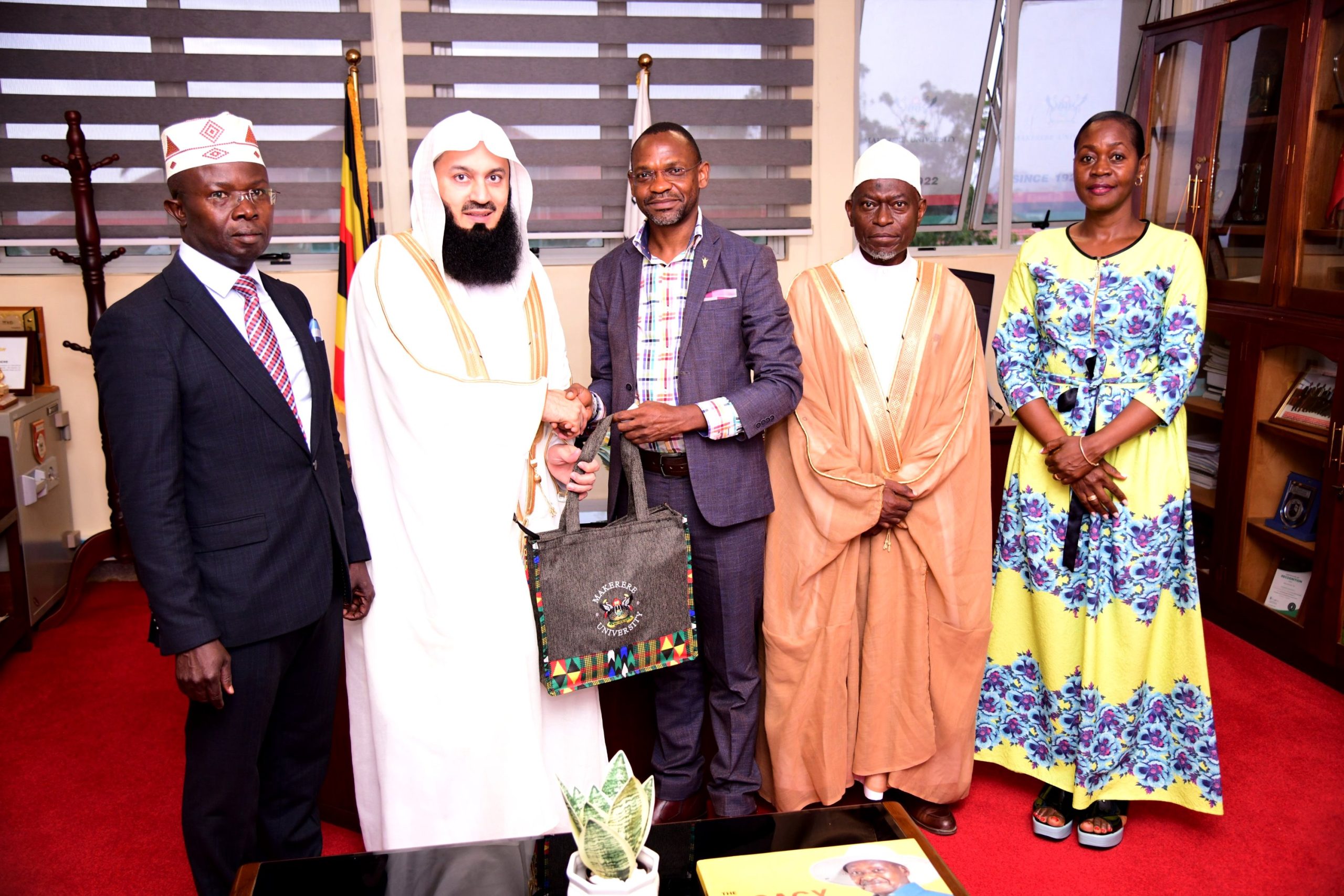
By Ritah Namisango
Mufti Ismail ibn Musa Menk has urged youth to be productive and hardworking even under great hardships.
“Whatever the country will be, depends on the youth. When you are young, ensure that you are productive. I advise you to encourage each other with love, respect and support in order to develop your country. Pray together, play together and work together,” said Mufti Menk.
He stated: “I am here to tell the youth in Uganda to work and develop their communities. You must develop a positive attitude towards work and your country. I advise you to shun any bad habit so that you become responsible citizens. You must shun laziness, idleness and bad habits such as use of drugs, addiction to alcohol and pornography. You must develop good habits. When you disagree with someone, let it be with respect.”
This was during the Mufti Menk Public Lecture held at the Makerere University Rugby Grounds on March 8, 2024. Running under the theme, ‘Muslim Youth and Work Ethics’, the lecture was hosted by the Office of the Makerere University Imaam. He was officially welcomed by Prof. Umar Kakumba, the Deputy Vice Chancellor for Academic Affairs, in his capacity as the Acting Vice Chancellor, and Dr. Sowed Juma Mayanja, the University Imaam.
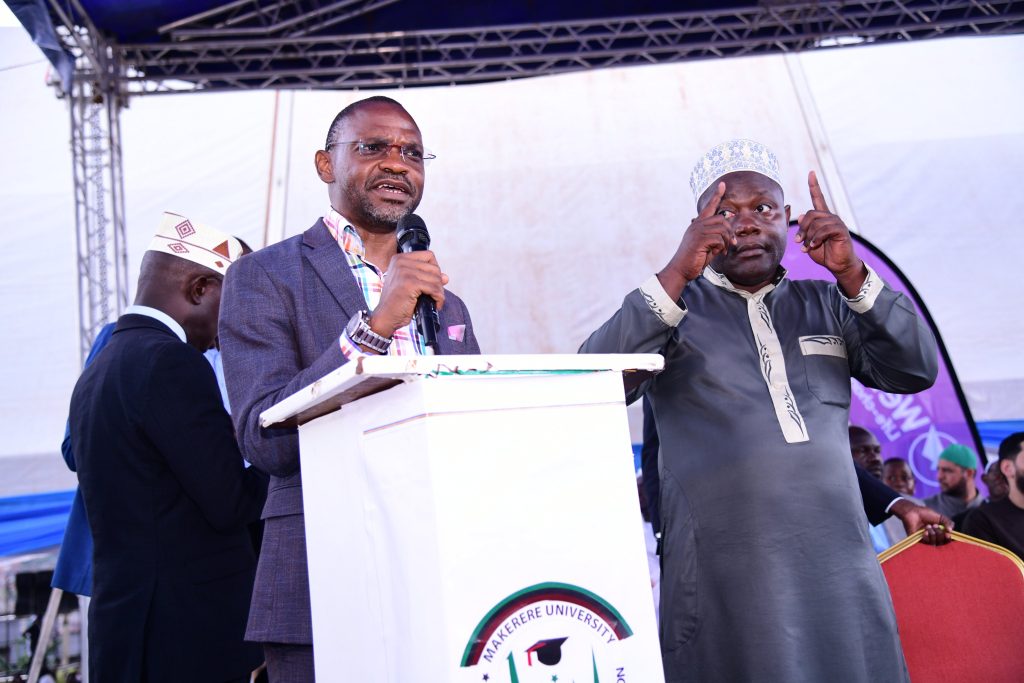
Mufti Menk, as he is popularly known, is the grand mufti of Zimbabwe, the head of the fatwa department of the Council of Islamic Scholars of Zimbabwe and a renowned international Muslim scholar and motivational speaker. He holds a degree in Sharia and a doctorate in Social Guidance. His lectures boast a wide audience on YouTube and other social media platforms globally. His lectures and preaching are credited with having converted millions of people to Islam.
Mufti Menk was accompanied by Sheikh Wael Ibrahim from Australia and Dr. Muhammad Salah from Egypt, each of whom was given a preaching session.
Some of the University officials who listened to the lecture include: Prof. Buyinza Mukadasi-Academic Registrar, Mrs Winifred Kabumbuli-Dean of Students, Prof. Abasi Kiyimba-Mak Department of Literature, Dr. Oria Hussein-Chairperson Makerere University Mosque Board, Dr. Muhammed Kiggundu Musoke-Patron (Makerere University Muslim Students Association) MUMSA, Ms Ritah Namisango-Principal Public Relations Officer, Mr. Ahmed Ssentongo (Imaam Emeritus), to mention but a few.
THE LECTURE
The Acting Vice Chancellor, Prof. Umar Kakumba welcomed Mufti Menk and his delegation to Makerere University-the institution that nurtured and trained great men and women who have contributed to the development of the continent. “It is a great honour to host you to speak to the youth on preaching peace, unity and development.”
Mufti Menk acknowledged Makerere University leadership, staff and students for the warm reception. He applauded Allah for the good weather, the green and trees at Makerere University, and for all the good that Allah, bestowed upon Uganda, a beautiful country with hardworking people, organic foods such as very sweet bananas as well as delicious pineapples. He affirmed that Uganda is indeed the pearl of Africa.
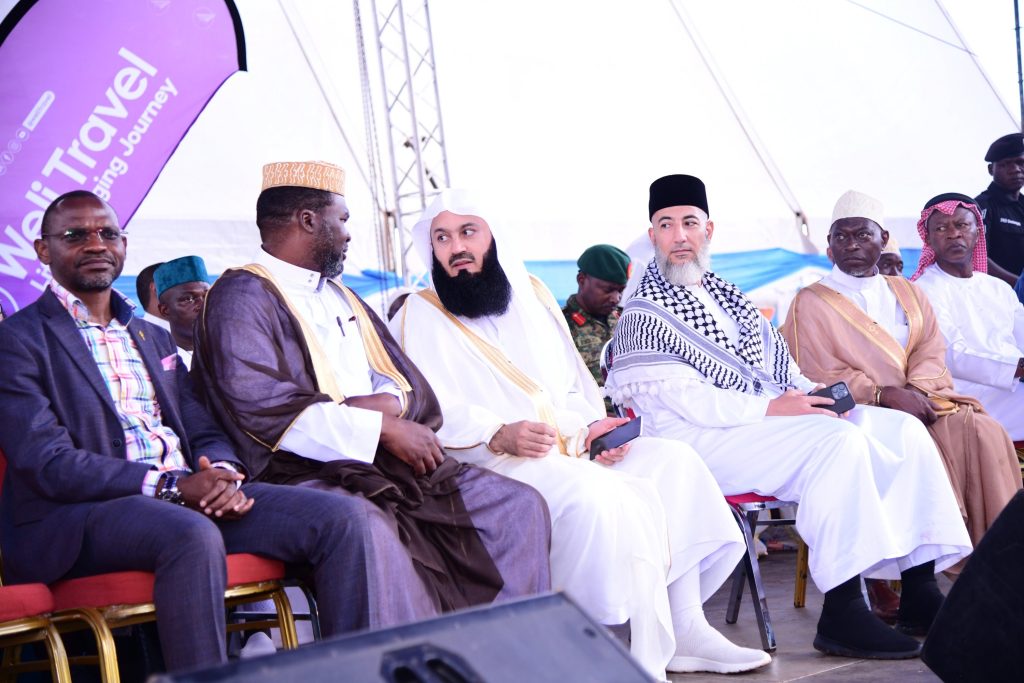
In his youth-centred lecture, he rallied the youth to be the torch bearers including the realization that they have a great responsibility to determine the destiny of Uganda. He explained that this starts with the youth recognizing this calling, working towards developing a positive attitude, believing that they can make a positive difference, shunning bad habits, and committing to being responsible citizens.
“To the youth and everyone here, I encourage you to build yourself. No one is going to build you up, if you do not,” he remarked, before adding “You are young, the future is in your hands, if you do the right things, the future will be bright.”
He reminded the youth to avoid words of hate for they bring about destruction. “Watch your words, watch your mouth. If you do not agree with someone, disagree with respect.”
Aware of the existence of a number of religious groups, Mufti Menk acknowledged this diversity and offered a message of living in harmony with one another. “Be careful about how you disagree with people from another faith. If we disagree, it should be with respect.”
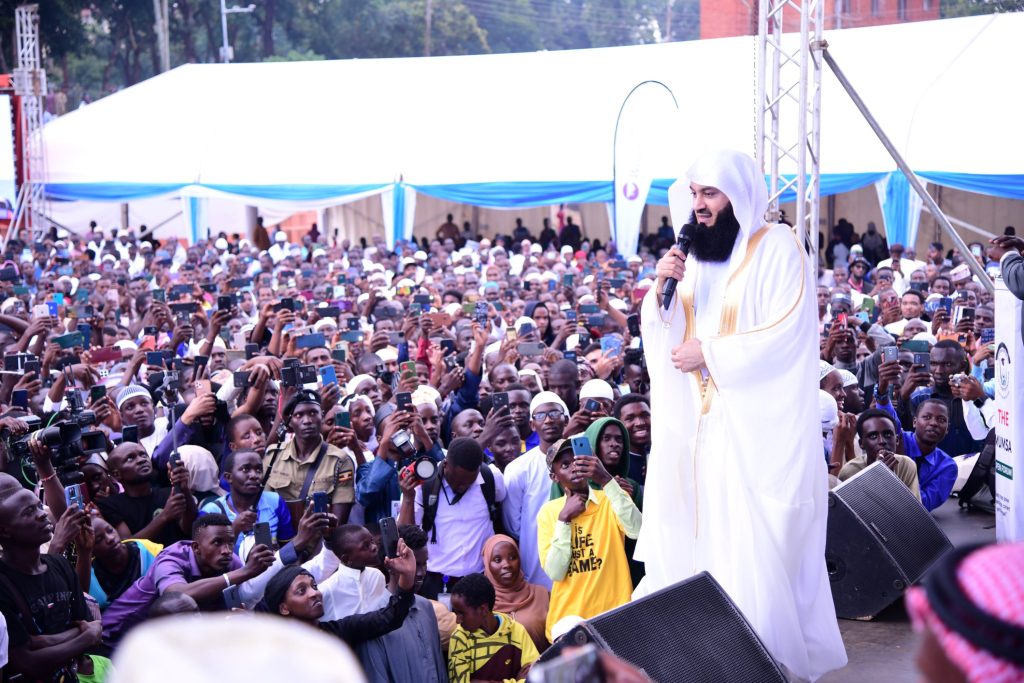
To the youth from poor backgrounds, Mufti Menk provided a message of hope and encouragement pointing out that many people from such backgrounds have succeeded in life. “Even if you come from a poor background, you can achieve. I encourage you to work hard, keep trying, never give up, and you will achieve.”
Tackling leadership, Mufti Menk guided that true leadership is heavily anchored in solving problems, and not fleeing from them. “Differences between us are normal, but differences can make us or break us depending on how we handle them. Those who aim to solve the problems and conflicts in the family, the Ummah or the country are the true leaders.”
Mufti Menk said the youth should be agitated if they lose connection with Allah. He advised youth to target their efforts and love towards Allah, above anyone and anything else, and to avoid doing things that displease Allah and compromise their relationship with Allah. He called upon the youth to uphold the importance of prayer. “Whatever you do, ask for Allah’s guidance. Do not ever get prayer out of your life.”
He implored the youth to use social media constructively such as learning, doing business and job creation, instead of gossip, hate speech, pornography, addiction and general idleness. “Take the example of TikTok; the bad side of TikTok is spreading faster than the good side. So, I urge you, when you see a good and useful message on TikTok, do not just read it and flip on; instead, like it and forward it to many people so that the good messages can outnumber the bad ones.”
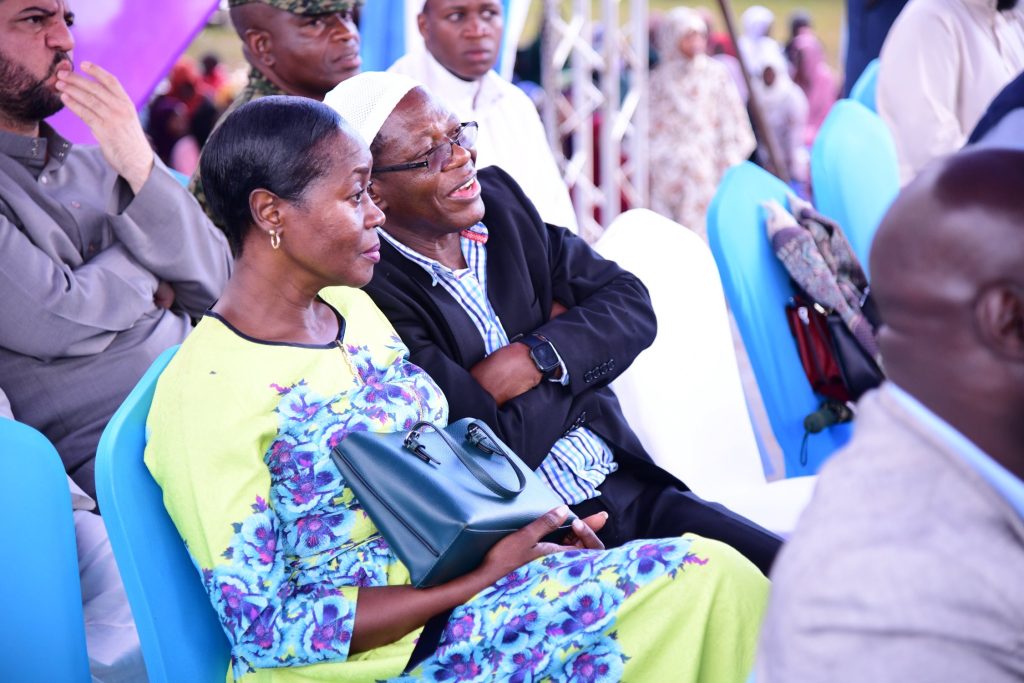
The Mufti cautioned the youth against disrespecting people they may not agree with. “Even in Islam, there are many sects, but they are all part of the Ummah, and should be accommodated. Everyone makes mistakes. Even married couples or siblings disagree. Therefore, you should learn to live with diverse people in the Ummah or in your country. You should emulate Prophet Muhammad (PBUH) who would painstakingly speak to people in the wrong, to win them over and expand the Ummah,” he counseled.
Mufti Menk urged youth to fight bad habits, especially addictions such as pornography, substance abuse, adultery, hate speech and gossip. He advised them to be on the guard to resist temptations that arise from the various media in our hypersexual age. To achieve this, he said, youth need to develop self-confidence and self-esteem.
“Do not be shy; look for help whenever you are in problems of addiction. Be careful and selective because the media promotes a lot of bad desires and behaviours. Care for and help one another. None of you is useless, but you must realize this fact yourself. Drop the negative attitude, and adopt a positive attitude towards different situations and relationships.”
On entrepreneurship, Mufti Menk shared his belief that it provides a solution to lack of jobs and unemployment of the youth. “There is a blessing in entrepreneurship. Sometimes Allah has chosen you for business /entrepreneurship,” he highlighted.
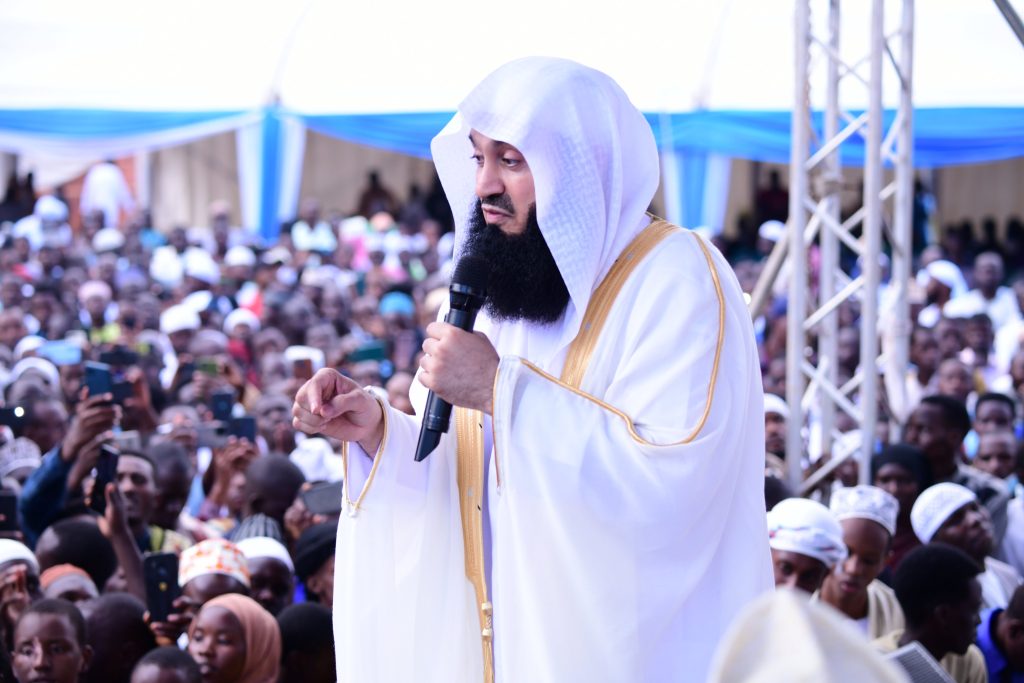
He appealed to the youth to continue searching for jobs. “Don’t give up looking for jobs, scarce as they may be. But, in the meantime, buy something and sell it, do some entrepreneurship. Avoid complaining, and never give up! However intelligent you may be, never stop praying to and trusting in Allah! Never take prayer out of the equation! Also, help those more challenged or vulnerable than you, such as orphans, widows, persons with disabilities or the unemployed.”
OTHER ACTIVITIES
Other activities of the day included Qur’anic recitation by a male student, three preaching sessions, Jummah prayers and Asr prayers.
Being the International Women’s Day, the preaching during the Jummah prayers focused on the fact that Islam gave a lot of rights to women such as inheritance of property. However, the preacher stressed that according to Allah, obligations are more important than rights for every human being.
On March 9, the Mufti attended a religious and interactive cooperation dinner at Serena Kampala hotel for charity causes, where a ticket cost Shs 150,000 for individual person and Shs 5 million for a table.
The organizers of the Mufti’s visit to Uganda said they had invited all Imaams of the 15,000 mosques in the country and all district khadis to the activities of both days.
You may like
-


Over 9,200 to graduate at Makerere University’s 76th Graduation
-


Meet Najjuka Whitney, The Girl Who Missed Law and Found Her Voice
-


Makerere University School of Public Health Graduates First Cohort of Cost-Effectiveness Analysis Short Course
-


Climate variability found to shape malaria trends in Yumbe District
-


Mak hosts First African Symposium on Natural Capital Accounting and Climate-Sensitive Macroeconomic Modelling
-


Uganda Martyrs Namugongo Students Turn Organic Waste into Soap in an Innovative School Project on Sustainable Waste Management
General
Over 9,200 to graduate at Makerere University’s 76th Graduation
Published
4 hours agoon
February 24, 2026
Pomp and colour defined the opening day of the Makerere University’s 76th Graduation Ceremony as thousands gathered to celebrate academic excellence and new beginnings.
The historic ceremony has brought together scholars, families, friends and industry partners in a vibrant celebration of achievement and possibility. Throughout the four-day event, the University will confer degrees and award diplomas to 9,295 graduands in recognition of their dedication and hard work.
Among the graduates, 213 will receive Doctor of Philosophy (PhD) degrees, 2,503 will graduate with Master’s degrees, and 6,343 will earn Bachelor’s degrees. In addition, 206 students will graduate with postgraduate diplomas, while 30 will be awarded undergraduate diplomas.
Of the total number of graduands, 4,262 are female and 5,033 are male. According to Vice Chancellor, this marks the first time in 15 years that male graduands have outnumbered their female counterparts.
The best overall graduand in the Sciences, Esther Ziribaggwa, graduated on the opening day with the Bachelor of Agricultural and Rural Innovation and an impressive Cumulative Grade Point Average (CGPA) of 4.77.

The ceremony marks a proud moment for Makerere University as it continues to nurture top-tier professionals across diverse fields.
While presiding over the graduation, the State Minister for Primary Education, Hon. Dr. Joyce Moriku Kaducu, on behalf of the First Lady and Minister of Education and Sports, Hon. Janet Kataaha Museveni, pointed out that Makerere University is a model institution, where leaders are nurtured, scholars are sharpened, and where dreams have been given direction.
In her address, Hon. Museveni, highlighted Government’s deliberate investment in research, innovation, and infrastructure to strengthen higher education in Uganda.
“The establishment of the Makerere University Research and Innovation Fund (RIF), supports high-impact research and innovation that directly contributes to national priorities and development. Through this initiative, thousands of researchers and innovators have pursued practical, scalable solutions that are transforming communities and key sectors across Uganda,” Mrs Museveni, said.
The Minister also noted that Parliament’s approved a USD 162 million concessional loan to upgrade science, technology, and innovation infrastructure at Makerere University. The funding will facilitate the construction of modern laboratories, smart classrooms, and state-of-the-art facilities for Engineering and Health Sciences, investments expected to position the University firmly within the Fourth Industrial Revolution.
“Government has embarked on the construction of a National Stadium at Makerere University and other institutions of higher learning across the country. This will promote physical education, strengthen talent identification, and boost investment in the sports sector,”

Turning to the graduands, the Minister encouraged them to see themselves not merely as job seekers, but as job creators and solution-makers.
Uganda and Africa need innovators who will modernize agriculture; engineers who will build quality infrastructure; healthcare professionals who will strengthen health systems; and educators who will inspire the next generation,” the Honourable Minister said.
She reminded graduates that they are entering a rapidly changing world shaped by Artificial Intelligence, climate change, and shifting global markets. To thrive, she advised them to remain adaptable, creative, and committed to lifelong learning.
She also encouraged graduates interested in entrepreneurship to tap into the Government’s Parish Development Model, which provides community-based financing and production support.
Quoting Proverbs 3:5–6, the Minister urged the graduates to trust in God as they embark on their next chapter.
She extended special appreciation to the Mastercard Foundation for its 13-year partnership with Makerere University in expanding access to education and empowering young people in Uganda and beyond.
In his speech, the Chancellor of Makerere University, Dr Crispus Kiyonga, urged graduands to harness research, innovation and technology to drive Uganda’s transformation.

“This is a milestone in your lives. You have invested time, discipline and hard work to attain these qualifications. It is important that you derive value from this achievement, not only for yourselves, but for your families and for society.” Dr Kiyonga, said.
Dr. Kiyonga expressed gratitude to the Government of Uganda for its continued financial support to the University, particularly the funding allocated under MakRIF, which he described as critical in strengthening the institution’s research capacity.
“Research plays a very vital role in the development of any community. Makerere as the oldest University in the country is doing a significant amount of research, However, more work is required to mobilize additional resources to further strengthen research at the University.” Dr Kiyonga, noted.
Acknowledging the challenges of a competitive job market, Dr. Kiyonga encouraged graduates to think beyond traditional employment pathways.
“It is true that the job market may not absorb all of you immediately. But the knowledge you have acquired is empowering. You can create work for yourselves, individually or in teams.” Dr Kiyonga, said.
He advised the graduands to embrace discipline, integrity and adaptability in the workplace, and to take advantage of technology and digital platforms to innovate and respond to societal challenges.
“Every development challenge presents an opportunity. Believe that you can apply your knowledge to create solutions with impact.” He said.
Addressing the congregation, the Vice Chancellor, Prof Barnabas Nawangwe, congratulated the graduands, particularly staff and societal leaders on their respective achievements.

“I congratulate all our graduands upon reaching this milestone. In a special way I congratulate the members of staff, Ministers, and Members of Parliament that are graduating today as well as children and spouses of members of staff,” Prof Nawangwe, said.
In his speech, Prof Nawangwe, recognized outstanding PhD students, particularly members of staff. who completed their PhDs in record time without even taking leave from their duties.
He called upon graduates not to despise humble beginnings but rather reflect on the immense opportunities around them and rise to the occasion as entrepreneurs.
“You are all graduating with disciplines that are needed by society. We have equipped you with the knowledge and skills that will make you employable or create your own businesses and employ others. Do not despair if you cannot find employment. Instead, reflect on the immense opportunities around you and rise to the occasion as an entrepreneur,” Prof Nawangwe, said.
Prof Nawangwe called upon the graduands of PhDs to use their degrees to transform the African continent.
“As you leave the gates of Makerere I urge you to put to good use the knowledge you have received from one of the best universities in the World to improve yourselves, your families, your communities, your Country and humanity. Let people see you and know that you are a Makerere alumnus because of the way you carry yourself in society with dignity and integrity. Put your trust in God and honour your parents and opportunities will be opened for you,” Prof Nawangwe, said.
Delivering a key note address, Prof. Nicholas Ozor, the Executive Director of the African Technology Policy Studies Network Nairobi, Kenya ((ATPS). Reminded the graduates that a degree is not a finish line but the beginning of accountability. “The world is a complex, fast changing and deeply unequal. Degrees make you responsible for others not better than them,” Prof Ozor, said.

The 76th Graduation Ceremony of Makerere University will be held from Tuesday 24th to Friday 27th February, 2026. A total of 213 PhDs (87 female, 126 male), 2,503 Masters (1,087 female, 1,416 male), 206 Postgraduate Diplomas (80 female, 126 male), 6,343 Undergraduate Degrees (2,999 female, 3,344 male), and 30 Undergraduate Diplomas (9 female, 21 male) will be graduating from all the Colleges.
Ms. Sarah Aloyo and Ms. Nakato Dorothy both students of the Bachelor of Procurement and Supply Chain Management emerged as the best in the Humanities and Best Overall students with a CGPA of 4.93. Mr. Ssewalu Abdul, a Bachelor of Leisure and Hospitality Management student emerged second best in the Humanities with a CGPA 4.90. Ms. Esther Ziribaggwa emerged as the best student in the Sciences with a CGPA of 4.77 in the Bachelor of Agricultural and Rural Innovation, while Mr. Simon Mungudit emerged second best in the Sciences with a CGPA of 4.76 in the Bachelor of Science in Petroleum Geoscience and Production.
Commencement Speakers
- Day 1 – Prof. Nicholas Ozor, the Executive Director of the African Technology Policy Studies Network, Nairobi, Kenya
- Day 2 – Prof. Dr. Maggie Kigozi, Chairperson Makerere University Endowment Fund Board
- Day 3 – Dr. Patricia Adongo Ojangole, Managing Director, Uganda Development Bank Limited
- Day 4 – Ms. Reeta Roy, Former President & Chief Executive Officer, Mastercard Foundation
The 76th Graduation Ceremony will be held at the Freedom Square following the schedule below:
Tuesday, 24th February, 2026
College of Agricultural and Environmental Sciences (CAES)
College of Computing and Information Sciences (CoCIS)
College of Education and External Studies (CEES)
School of Law (SoL)
Livestream Link for Day 1: https://youtube.com/live/wVGPA0FJ9pU
Wednesday, 25th February, 2026
College of Health Sciences (CHS)
College of Natural Sciences (CoNAS)
College of Veterinary Medicine, Animal Resources and Bio-security (CoVAB)
School of Public Health (SPH)
Thursday, 26th February, 2026
Makerere University Business School (MUBS)
College of Business and Management Sciences (CoBAMS)
Friday, 27th February, 2026
College of Engineering, Design, Art and Technology (CEDAT)
College of Humanities and Social Sciences (CHUSS)
Institute of Gender and Development Studies (IGDS)
Makerere Institute of Social Research (MISR)
General
Mak Selected to Host Alliance for African Partnership Africa Office
Published
1 day agoon
February 23, 2026
Makerere University has been selected to host the Africa Office of the Alliance for African Partnership (AAP). The significant milestone that underscores Makerere’s role in fostering research, innovation, and global collaborations across the continent was announced at a meeting of the University’s Central Management with an AAP delegation on 23rd February 2026.
Makerere’s selection was based on the University’s robust commitment, alignment with the AAP’s Strategic Plan, and proven ability to manage consortium activities. The AAP, which was initiated by Michigan State University (MSU) in collaboration with Ten African Universities and agricultural policy research networks in 2016, targets critical challenges in education, youth empowerment, health and nutrition, agri-food systems, science and technology, water, energy, environment, and culture and society.
Addressing the delegation consisting of AAP Co-Directors from MSU, Dr. Jose Jackson-Malete and Dr. Amy Jamison, accompanied by newly-appointed Director of the AAP Africa Office, Dr. Racheal Ddungu Mugabi and Ms. Clare Cheromoi, the Vice Chancellor, Prof. Barnabas Nawangwe who appreciated the choice of Makerere to host the Africa Office said:
“One of the greatest challenges facing African universities is PhD training, particularly supervisory capacity. Through partnerships such as the Alliance for African Partnership we can leverage international expertise to strengthen supervision—whether through training supervisors or through joint supervision arrangements.”
Prof. Nawangwe equally applauded joint initiatives such as the Grant Writing and Publication project, which gave rise to the establishment of a Writing Centre that he said can be used to build capacity in AAP member universities with Makerere as the hub. Officially launched on 21st March 2023, the project is living up to its expectation of becoming a springboard for strong postdoctoral collaborative research for both institutions and other US universities.
Dr. Titus Awokuse, Vice Provost and Dean for International Studies and Programs at Michigan State University (MSU) who attended virtually, reiterated that Makerere’s selection reflects its long-standing commitment to advancing African higher education, research excellence, and meaningful global collaboration.
Reflecting on the origins of the Alliance for African Partnerships (AAP), Dr. Awokuse explained that nearly a decade ago, MSU initiated a transformative conversation in Atlanta centered on the question: How should we partner differently? From this dialogue emerged AAP—an Africa-centered consortium that now brings together 12 institutions across Africa and the United States.

He emphasized that AAP is grounded in equity, mutual benefit, shared leadership, and deep respect for African priorities and expertise. Since its founding, MSU has served as convener and key supporter, working with member institutions to strengthen research collaboration, promote faculty and student engagement, and address shared development priorities.
Dr. Awokuse underscored that AAP’s success is the result of collective vision and commitment, not the efforts of a single institution. He paid tribute to Lilongwe University of Agriculture and Natural Resources for hosting the Africa Office in its early years and acknowledged the foundational leadership of the inaugural Africa Office Director.
He described the launch of the Africa Office at Makerere University as a significant milestone that reinforces Africa-led leadership, strengthens regional collaboration, and enhances responsiveness to emerging opportunities. MSU, he affirmed, remains fully committed to AAP and to working closely with Makerere and all consortium partners to expand collaborative research, nurture the next generation of scholars, and advance Africa-led solutions to global challenges.
The newly-appointed AAP Africa Office Director, Dr. Racheal Ddungu Mugabi is a member of faculty in the Department of Development Studies, Institute of Gender and Development Studies. Her work on intersectional inequalities in Uganda and other Global South regions uniquely positions her to drive collaborative research and partnerships at the Africa Office.
Initially founded by ten African Universities and MSU, AAP now comprises eleven African members including; the African Network of Agricultural Policy Institutes (ANAPRI)-Zambia, Egerton University-Kenya, Lilongwe University of Agriculture and Natural Resources (LUANAR)-Malawi, Makerere University-Uganda, United States International University-Africa-Kenya, Universite Cheikh Anta Diop-Senegal, Universite Yambo Ouologuem de Bamako-Mali, University of Botswana-Botswana, University of Dar es Salaam-Tanzania, University of Nigeria, Nsukka-Nigeria, and the latest, University of Pretoria-South Africa.
These Universites collaborate under Focal Points to advance policy-relevant research and sustainable development. Makerere University’s Focal Point is Prof. Robert Wamala, Director of Research, Innovations and Partnerships (DRIP).
Addressing the University Management, Dr. Jackson-Malete outlined the African Futures Research Leadership Program, which nurtures early career scholars through mentorship and skill-building as one of AAP’s flagship programs. She noted that the Program that prioritizes female participants or men committed to promoting women in higher education has for the first time during its fifth cohort admitted the first male, Dr. Alfadaniels Mabingo from the Department of Performing Arts and Film, Makerere University.
The AAP Africa Office at Makerere will coordinate activities, boost research collaboration, mobilize resources, and enhance global engagements for socio-economic transformation. This aligns with Makerere‘s broader goals of leveraging international expertise to build resilient institutions.
View more photos from the event: https://flic.kr/s/aHBqjCLjoA
Trending
-

 Humanities & Social Sciences2 days ago
Humanities & Social Sciences2 days agoMeet Najjuka Whitney, The Girl Who Missed Law and Found Her Voice
-

 Health6 days ago
Health6 days agoUganda has until 2030 to end Open Defecation as Ntaro’s PhD Examines Kabale’s Progress
-

 Agriculture & Environment5 days ago
Agriculture & Environment5 days agoUganda Martyrs Namugongo Students Turn Organic Waste into Soap in an Innovative School Project on Sustainable Waste Management
-

 General6 days ago
General6 days agoMastercard Foundation Scholars embrace and honour their rich cultural diversity
-

 Health2 weeks ago
Health2 weeks agoCall for Applications: Short Course in Molecular Diagnostics March 2026
